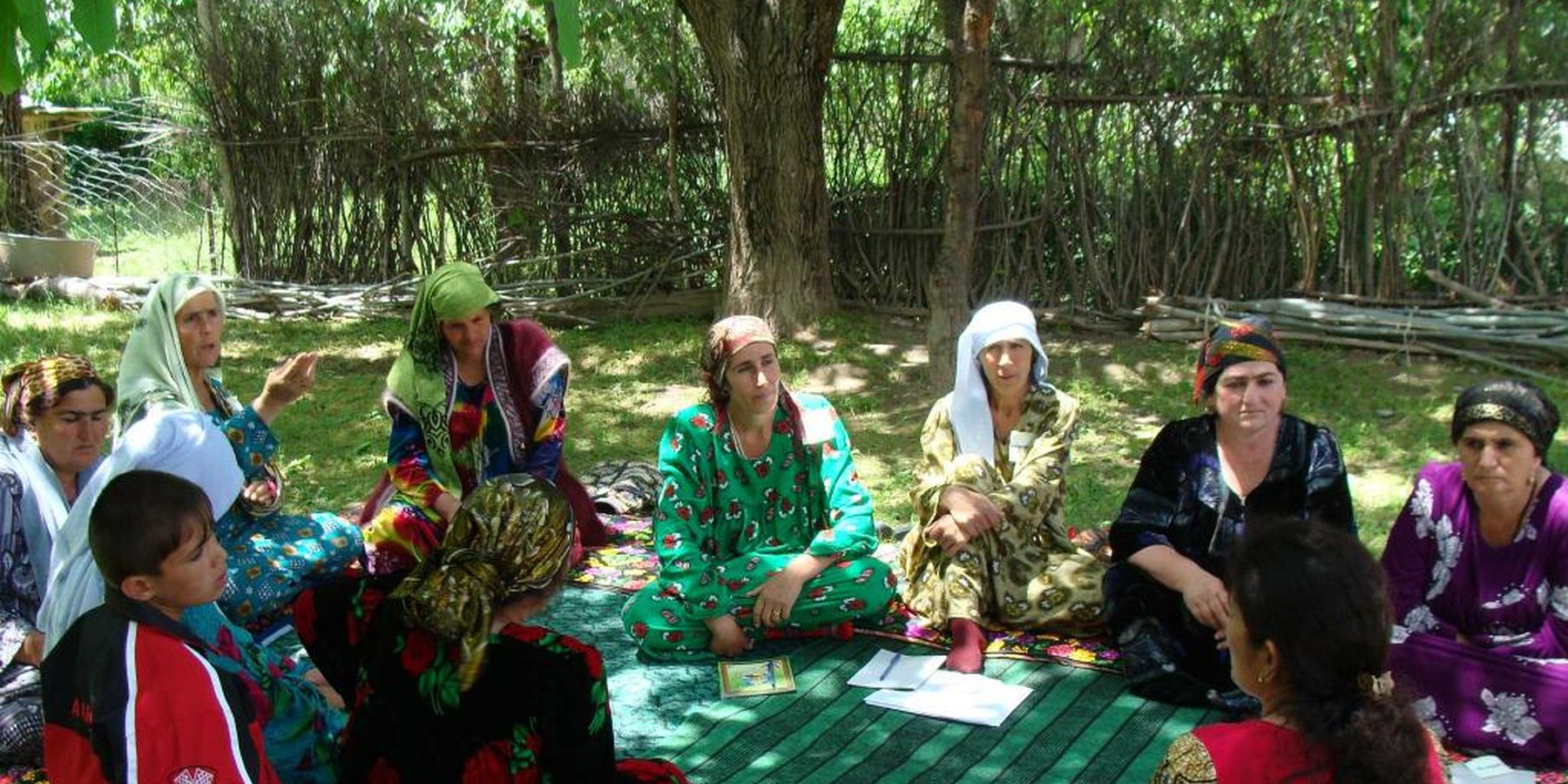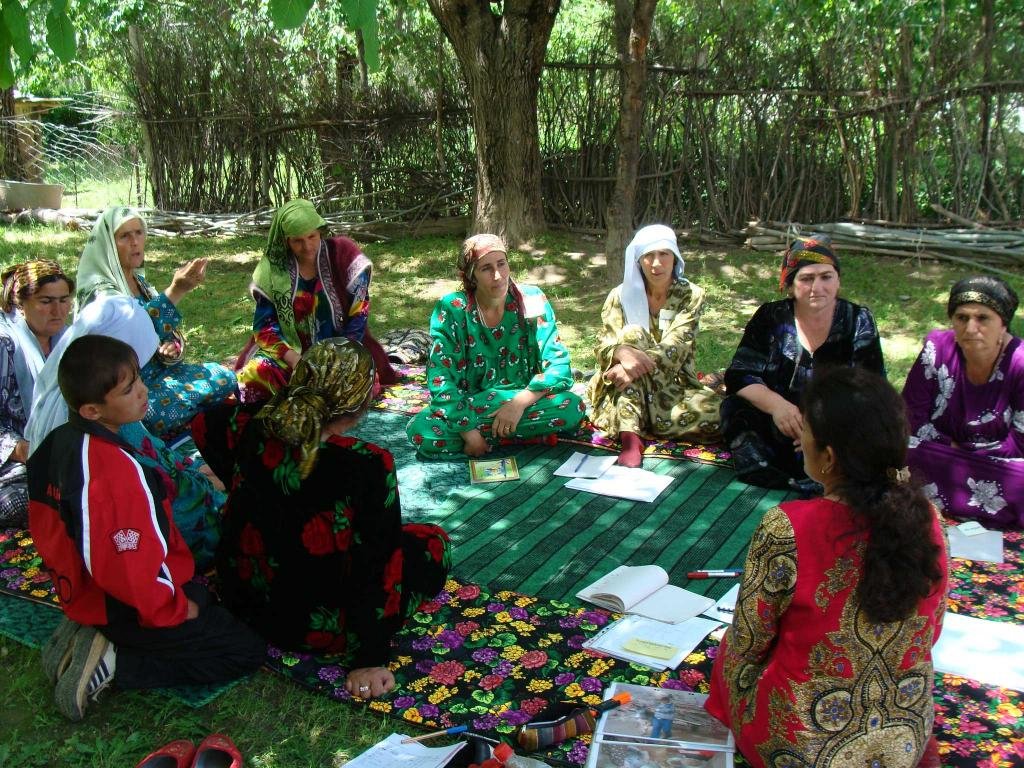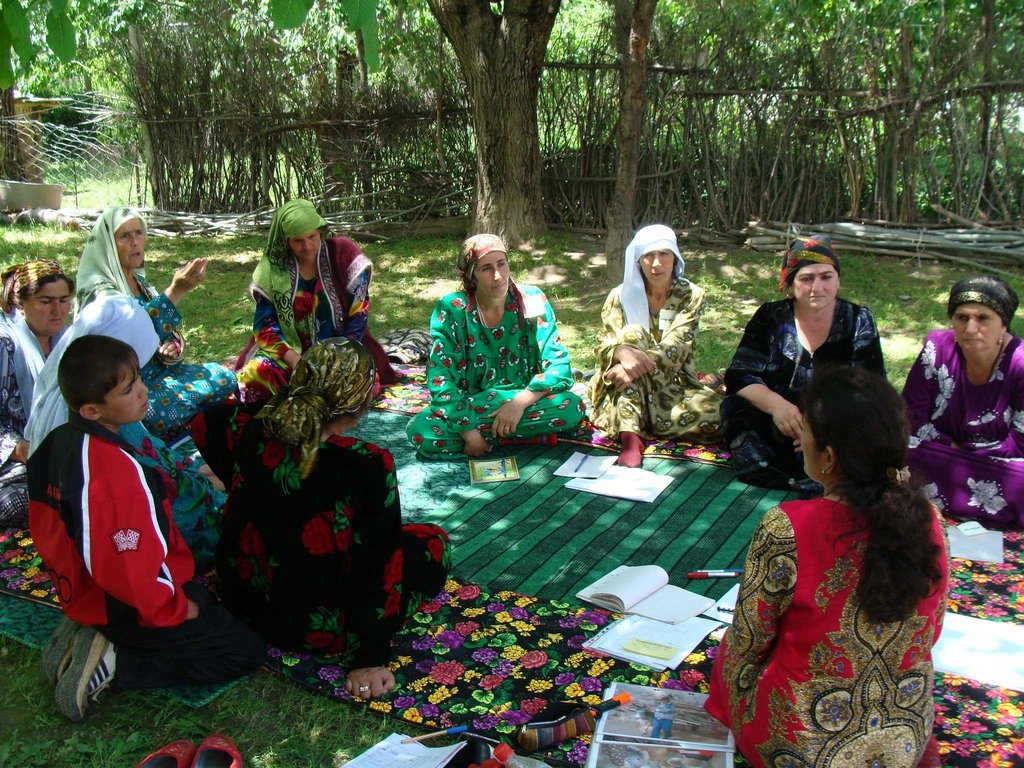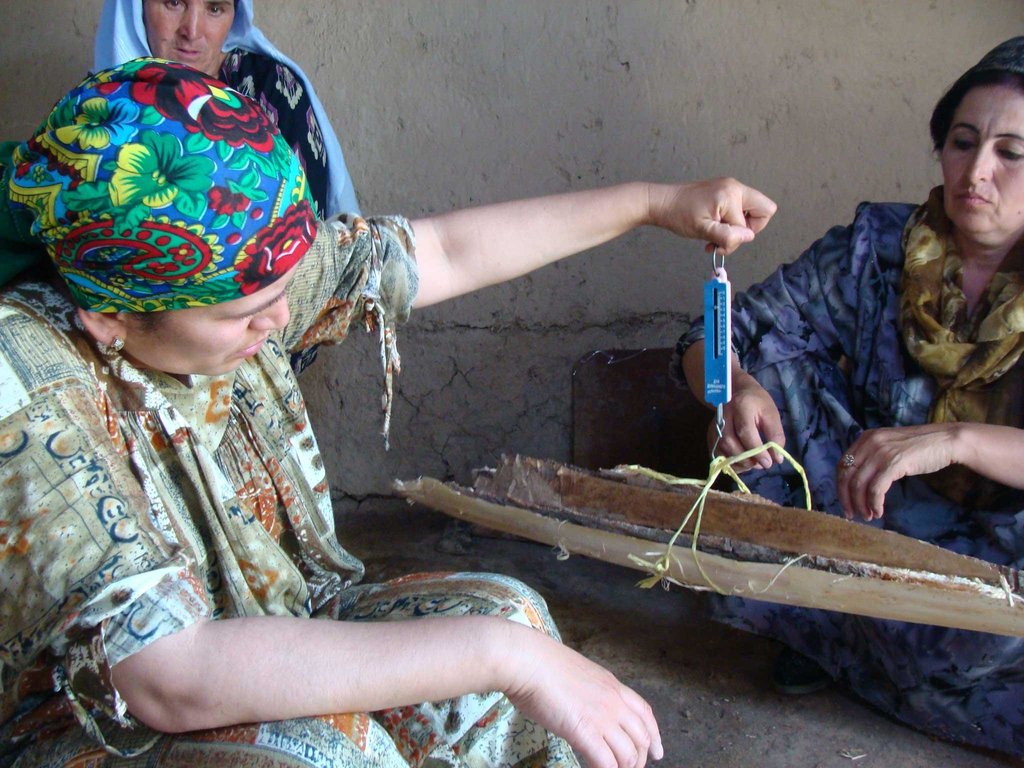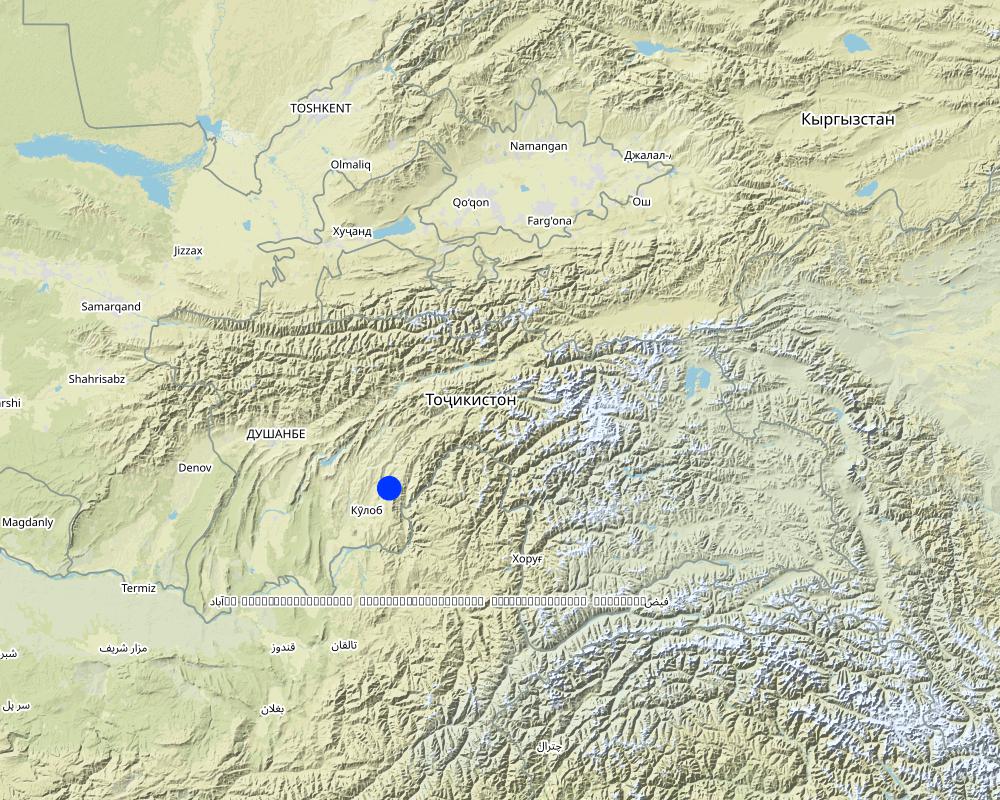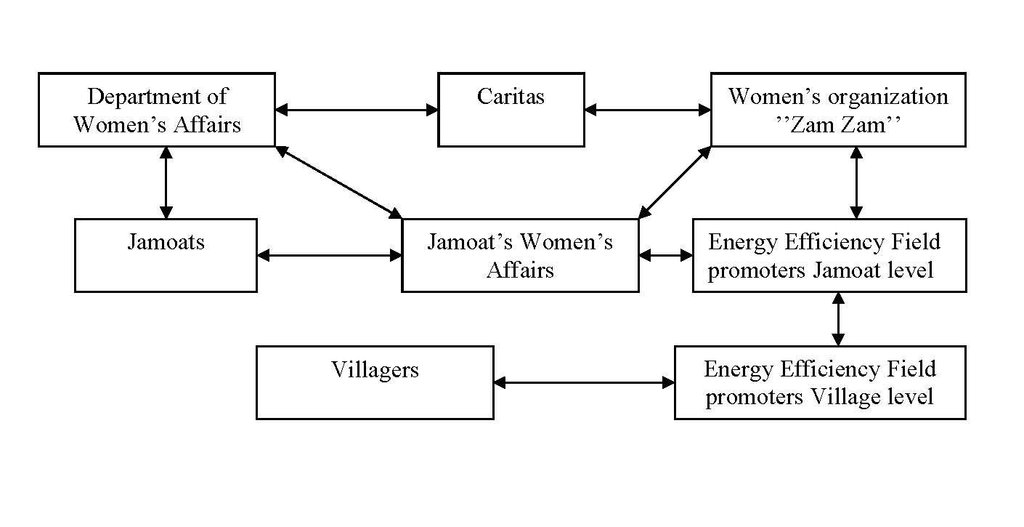Implementation through the government's Women's Affair Officers. [ทาจิกิสถาน]
- ผู้สร้างสรรค์:
- การอัพเดท:
- ผู้รวบรวม: Sa'dy Odinashoev
- ผู้เรียบเรียง: –
- ผู้ตรวจสอบ: David Streiff, Alexandra Gavilano, Joana Eichenberger
approaches_2449 - ทาจิกิสถาน
ดูส่วนย่อย
ขยายทั้งหมด ย่อทั้งหมด1. ข้อมูลทั่วไป
1.2 รายละเอียดที่ติดต่อได้ของผู้รวบรวมและองค์กรที่เกี่ยวข้องในการประเมินและการจัดเตรียมทำเอกสารของแนวทาง
ผู้เชี่ยวชาญ SLM:
ชื่อของโครงการซึ่งอำนวยความสะดวกในการทำเอกสารหรือการประเมินแนวทาง (ถ้าเกี่ยวข้อง)
Pilot Program for Climate Resilience, Tajikistan (WB / PPCR)1.3 เงื่อนไขที่เกี่ยวข้องกับการใช้ข้อมูลที่ได้บันทึกไว้ผ่านทาง WOCAT
วันที่เก็บรวบรวมข้อมูล (ภาคสนาม):
06/07/2009
ผู้รวบรวมและวิทยากรหลักยอมรับเงื่อนไขเกี่ยวกับการใช้ข้อมูลที่ถูกบันทึกผ่านทาง WOCAT:
ใช่
2. คำอธิบายของแนวทาง SLM
2.1 การอธิบายแบบสั้น ๆ ของแนวทาง
The use of the government appointed District Womens Affair Officer to mobilise women throughout the community to implement technologies.
2.2 การอธิบายอย่างละเอียดของแนวทาง
การอธิบายอย่างละเอียดของแนวทาง:
Aims / objectives: The aim of the approach was to empower women through support from the government’s Women's Affairs Officer (WAO), to implement low cost energy efficient technologies within individual households. Women being the primary users of energy within the household, can become the main agents for change in applying more efficient methods to the use of natural resources to meet their cooking, heating and energy needs. Therefore, reducing fuel costs, and dependence upon local natural resources. The district local government employs a WAO, who is the government representative for women’s issues in the district. Once the WAO became supportive of the idea, she was able to engage the Women’s Affairs Officers at the Jamoat level.
Methods: This approach is fundamentally a training pyramid approach. An expert conducted a series of training sessions to interested women on the details of the technology. The training involves demonstrations of the technology, it's benefits, information on how to purchase or make the material required, and how to implement the technology. The first session is a ‘Training of Trainers’. The participants are then provided with training materials, and are invited to replicate the training in their own community. The process is continuously repeated, subsequently broadening the target audience. Zamzam, the local women’s association of the district helped suggest potential community candidates for trainers, and provided practical training sessions on energy efficiency measures through the TOT.
Stages of implementation: The implementation of the project started with an inception meeting with the District Women’s Affairs Officer to sell the idea, and to gain the local government’s support. Once she was supportive of the idea, a district level meeting was held with all the Women’s Affairs Officers at the local level (i.e. Jamoat) and two women representatives from each Jamoat. At this meeting the ladies were introduced to the technology i.e. cooking stove modification and heat exchangers. The meeting further discussed on how each jamoat would receive training, and what training materials were to be distributed to the communities. The meeting enabled issues with the technology, logistics, monitoring and overall set up of the approach to be discussed. Afterwards an expert trained a group of women from each Jamoat on the technology and provided them with materials so that the training could be repeated within their own communities.
Role of stakeholders: This is a women's led approach, the Women’s' representative within the government, who are also Women’s association members, were responsible for organisation of the trainers, logistics and government documentation support. With support from Zamzam, the active women in the community were selected as trainers to receive training from the experts and provide subsequent outreach training to their communities.
2.3 รูปภาพของแนวทาง
2.5 ประเทศ ภูมิภาค หรือสถานที่ตั้งที่ได้นำแนวทางไปใช้
ประเทศ:
ทาจิกิสถาน
ภูมิภาค/รัฐ/จังหวัด: :
Khatlon
ข้อมูลเฉพาะเพิ่มเติมของสถานที่ตั้ง:
Muminabad
Map
×2.6 วันที่เริ่มต้นและสิ้นสุดของแนวทาง
ระบุปีที่เริ่ม:
2009
การสิ้นสุดลง (ถ้าแนวทางไม่ได้ใช้อีกต่อไป):
2010
2.7 ประเภทของแนวทาง
- governmental
2.8 เป้าหมายหรือวัตถุประสงค์หลักของแนวทาง
The Approach focused mainly on SLM with other activities (Energy Efficiency)
The aim of the approach was to mobilise the women within the community through the use of the government appointed District Women's Affairs Officer. Once the government appointee was engaged in the promotion of the technology, she was able to use her position to mobilise the Women's Representative at the local government level (Jamoat), and subsequently women's representatives within each village level. The approach exploits the existing government's women's network to empower women to implement technologies, whilst also gaining government support and assistance.
The SLM Approach addressed the following problems: The average household in the Muminabad area uses several tonnes of tapak (dung and straw mix) and firewood each year for cooking, baking and heating. This puts excessive strain on the local natural resources, and significantly reduces the amount of organic fertiliser used in land management, as well as the removal of tree and shrubs that stabilise the land and help prevent erosion from wind, surface water run off and livestock grazing.
2.9 เงื่อนไขที่เอื้ออำนวยหรือเป็นอุปสรรคต่อการนำเทคโนโลยีภายใต้แนวทางนี้ไปปฏิบัติใช้
การมีไว้ให้หรือการเข้าถึงแหล่งการเงินและบริการ
- เป็นอุปสรรค
At the beginning women did not know that modification of the cookingstoves were not expensive, and were initially not interested in learning about the adaptation.
Treatment through the SLM Approach: Demonstration of the technolgy and explanation of the costs.
การจัดตั้งระดับองค์กร
- เป็นอุปสรรค
The women have been using the same style of outdoor cooking stove for many years and did not consider or were open to changing the design.
Treatment through the SLM Approach: A group workshop created an open environment in which the women could think about their energy use, their cooking equipment and discuss potential changes.
3. การมีส่วนร่วมและบทบาทของผู้มีส่วนได้ส่วนเสียที่เกี่ยวข้อง
3.1 ผู้มีส่วนได้ส่วนเสียที่เกี่ยวข้องในแนวทางนี้และบทบาท
- ผู้ใช้ที่ดินระดับท้องถิ่นหรือชุมชนระดับท้องถิ่น
Women's group to conduct training on the technology and women in households
The active women in the village were selected to disseminate information
- ผู้เชี่ยวชาญ SLM หรือที่ปรึกษาการเกษตร
To organise the training materials.
- รัฐบาลระดับท้องถิ่น
District and local government women's affairs officers.
The entire approach was developed to engage women, as they would be the ones that would benefit most from the technology.
- องค์การระหว่างประเทศ
Provided the funding and monitoring.
3.2 การเกี่ยวข้องของผู้ใช้ที่ดินระดับท้องถิ่นหรือชุมชนระดับท้องถิ่นในช่วงต่างๆของแนวทาง
| ความเกี่ยวข้องของผู้ใช้ที่ดินระดับท้องถิ่นหรือชุมชนระดับท้องถิ่น | ระบุผู้ที่มีส่วนเกี่ยวข้องและอธิบายกิจกรรม | |
|---|---|---|
| การริเริ่มหรือการจูงใจ | ระดมกำลังด้วยตนเอง | It was members of the local community that thought of the idea and approached the governments Women's Affair Officer. |
| การวางแผน | ปฏิสัมพันธ์ | The local stakeholders organised a initial meeting to plan the implementation of the approach. |
| การดำเนินการ | ระดมกำลังด้วยตนเอง | Implementation was entirely through the local community, including government representatives at district and local level. |
| การติดตามตรวจสอบหรือการประเมินผล | จ่ายเงินหรือสนับสนุนจากภายนอก | This was undertaken by the donor and at the district level. |
| Research | ไม่มี | None |
3.3 แผนผังแสดงขั้นตอนการทำงาน (ถ้ามี)
คำอธิบาย:
An organisational chart showing how all the organisations worked together on the project.
ผู้เขียน:
Odinashoev, Sa (Muminabad, Tajikistan)
3.4 การตัดสินใจเลือกใช้เทคโนโลยี SLM
ระบุผู้ที่ทำการตัดสินใจเลือกเทคโนโลยีมากกว่าหนึ่งวิธีไปปฏิบัติใช้:
- ผู้ใช้ที่ดินเป็นผู้ตัดสินใจหลัก โดยการสนับสนุนจากผู้เชี่ยวชาญ SLM
การอธิบาย:
The idea for the approach was developed by representatives of the local community, who were interested in implementing a technology that would improve the lives of women in the community.
Decisions on the method of implementing the SLM Technology were made by mainly by SLM specialists with consultation of land users. The technology of improved cooking stoves was already developed, tried and tested, the approach orginated from already knowing which technology to implement.
4. การสนับสนุนด้านเทคนิค การสร้างขีดความสามารถ และการจัดการด้านความรู้
4.1 การสร้างขีดความสามารถ / การอบรม
ได้มีการจัดอบรมให้แก่ผู้ใช้ที่ดินหรือผู้มีส่วนได้ส่วนเสียคนอื่น ๆ หรือไม่:
ใช่
ให้ระบุว่าใครเป็นผู้ได้รับการอบรม:
- เจ้าหน้าที่ภาคสนาม / ที่ปรึกษา
- Women's groups
ถ้าเกี่ยวข้อง ให้ระบุ เพศ อายุ สถานภาพ ชาติพันธุ์ เป็นต้น:
The project personnel provided the initial training to the women, who in turn then trained within their own communities.
รูปแบบการอบรม:
- เกษตรกรกับเกษตรกร
- ใช้พื้นที่ทำการสาธิต
รูปแบบการอบรม:
- Training was held within the communties.
หัวข้อที่พูด:
The training was on energy efficiency measures, and how to reduce the amount of organic material used as fuel.
4.2 การบริการให้คำแนะนำ
ผู้ใช้ที่ดินมีการเข้าถึงการรับบริการให้คำปรึกษาหรือไม่:
ไม่ใช่
4.3 การเสริมความแข็งแกร่งให้กับสถาบัน (การพัฒนาองค์กร)
สถาบันได้รับการจัดตั้งขึ้นมาหรือเสริมความแข็งแกร่งโดยแนวทางนี้หรือไม่:
- ใช่ อย่างมาก
ระบุระดับของสถาบันที่ได้รับการเสริมความแข็งแกร่งหรือจัดตั้งขึ้นมา:
- ท้องถิ่น
ระบุประเภทของการให้ความช่วยเหลือสนับสนุน:
- การสร้างขีดความสามารถ / การอบรม
ให้รายละเอียดเพิ่มเติม :
Local NGO Zam Zam, a women's network, was used to conduct the training.
4.4 การติดตามตรวจสอบและประเมินผล
การติดตามตรวจสอบและประเมินผลเป็นส่วนหนึ่งของแนวทางหรือไม่:
ใช่
ความคิดเห็น:
no. of land users involved aspects were regular monitored by project staff through observations; indicators: The quality of the training was observed.
no. of land users involved aspects were regular monitored by project staff through measurements; indicators: The number of women that received training was monitored.
There were no changes in the Approach as a result of monitoring and evaluation: None
There were no changes in the Technology as a result of monitoring and evaluation: None
4.5 การวิจัย
การวิจัยเป็นส่วนหนึ่งของแนวทางหรือไม่:
ใช่
5. การสนับสนุนด้านการเงินและวัสดุอุปกรณ์
5.1 ระบุงบประมาณประจำปีสำหรับแนวทาง SLM นี้
ถ้าหากว่างบประมาณประจำปีไม่เป็นที่ทราบแน่นอน ให้ระบุช่วงลงไป:
- 2,000-10,000
แสดงความคิดเห็น (แหล่งของการระดมทุน ผู้บริจาคคนสำคัญ):
Approach costs were met by the following donors: government (Government covered costs related to workshop for women's groups): 10.0%; international non-government (Covered the expenses such as travel and materials.): 90.0%
5.2 การสนับสนุนด้านการเงิน / วัสดุอุปกรณ์ให้แก่ผู้ใช้ที่ดิน
ผู้ใช้ที่ดินได้รับการสนับสนุนด้านการเงิน / วัสดุอุปกรณ์ไปปฏิบัติใช้เทคโนโลยีหรือไม่:
ใช่
ถ้าใช่ ให้ระบุประเภทของการสนับสนุน เงื่อนไขและผู้จัดหามาให้:
The state provided personnel support and facilities for meetings
5.3 เงินสนับสนุนสำหรับปัจจัยนำเข้า (รวมถึงแรงงาน)
- อุปกรณ์
| ระบุปัจจัยนำเข้าที่ได้รับการสนับสนุน | เห็นด้วยระดับไหน | ระบุเงินสนับสนุน |
|---|---|---|
| metal door | ได้รับการช่วยเหลือทางการเงินบางส่วน | |
- อื่น ๆ
| อื่นๆ (ระบุ) | เห็นด้วยระดับไหน | ระบุเงินสนับสนุน |
|---|---|---|
| transport cost | ได้รับการช่วยเหลือทางการเงินแบบเต็ม | fuel, taxi |
ถ้าแรงงานโดยผู้ใช้ที่ดินเป็นปัจจัยนำเข้าที่มีอยู่มากมาย ระบุด้วยว่าเนื่องจาก:
- สมัครใจ
ความคิดเห็น:
It is a relatively low cost approach that required traing materials, transport and demonstration equipment. The main part of the finance was required for the implementation stage of the technology, whereby half the costs were met by the land user and the rest by the donor.
5.4 เครดิต
มีการจัดหาเครดิตมาให้ภายใต้แนวทาง SLM หรือไม่:
ไม่ใช่
6. การวิเคราะห์ผลกระทบและการสรุป
6.1 ผลกระทบของแนวทาง
ช่วยให้ผู้ใช้ที่ดินนำเอาเทคโนโลยี SLMไปใช้และบำรุงรักษาสภาพไว้ได้หรือไม่:
- ไม่ใช่
- ใช่ เล็กน้อย
- ใช่ ปานกลาง
- ใช่ อย่างมาก
The approach helped raise awareness on how to reduce the amount of organic material needed to meet the domestic fuel needs, and the saved material could be used as organic fertiliser.
ทำให้กลุ่มด้อยโอกาสมีอำนาจทางสังคมและเศรษฐกิจหรือไม่:
- ไม่ใช่
- ใช่ เล็กน้อย
- ใช่ ปานกลาง
- ใช่ อย่างมาก
It improved the cooking conditions of women, and reduced their workload in the collation of natural resources to meet the household fuel needs.
ปรับปรุงประเด็นของการถือครองที่ดินหรือสิทธิในการใช้ ซึ่งขัดขวางการนำเทคโนโลยีไปใช้ให้ดีขึ้น:
- ไม่ใช่
- ใช่ เล็กน้อย
- ใช่ ปานกลาง
- ใช่ อย่างมาก
Did other land users / projects adopt the Approach?
- ไม่ใช่
- ใช่ เล็กน้อย
- ใช่ ปานกลาง
- ใช่ อย่างมาก
Did the Approach lead to improved livelihoods / human well-being?
- ไม่ใช่
- ใช่ เล็กน้อย
- ใช่ ปานกลาง
- ใช่ อย่างมาก
The associated technology helped reduce smoke in the kitchens and a reduction in the amount of time, resources and finance that was spent on household fuel.
Did the Approach help to alleviate poverty?
- ไม่ใช่
- ใช่ เล็กน้อย
- ใช่ ปานกลาง
- ใช่ อย่างมาก
It helped reduce the amount of money spent on fuel and helped preserve natural resources.
6.2 แรงจูงใจหลักของผู้ใช้ที่ดินเพื่อที่จะนำ SLM ไปปฏิบัติใช้
- กำไร (ความสามารถ) อัตราส่วนค่าใช้จ่ายต่อผลประโยชน์ที่เพิ่มขึ้น
Reduce money spent on fuel.
- ภาระงานลดลง
The associated technologies helped reduce workload.
- กฎและระเบียบ (ค่าปรับ) หรือการบังคับใช้
The endorsement by the district government helped influence adoption rates.
- เกียรติภูมิ แรงกดดันทางสังคม ความเชื่อมแน่นทางสังคม
The approach tried to include as many women as possible, the social pressure to participate grew.
- การเข้าร่วมสมทบในขบวนการ โครงการ กลุ่ม เครือข่าย
To a degree there was empowerment of women.
- จิตสำนึกด้านสิ่งแวดล้อม
Reducing the amount of smoke in the outdoor kitchen
- well-being and livelihoods improvement
Hopefully improvement in health from less smoke, less money spent on fuel and less workload.
6.3 ความยั่งยืนของกิจกรรมของแนวทาง
ผู้ใช้ที่ดินสามารถทำให้สิ่งต่างๆ ที่ได้ปฏิบัติใช้โดยแนวทางนี้ยั่งยืนได้หรือไม่ (โดยไม่มีการสนับสนุนจากภายนอก):
- ใช่
ถ้าตอบว่าใช่ ให้อธิบายว่าอย่างไร :
The approach needs minimal finance to continue.
6.4 จุดแข็งและข้อได้เปรียบของแนวทาง
| จุดแข็ง / ข้อได้เปรียบของแนวทางในทัศนคติของผู้ใช้ที่ดิน |
|---|
| It is easy to train a group of women, it is much harder to train men. (How to sustain/ enhance this strength: The women could benefit from further instructions on how to train. ) |
| จุดแข็ง / ข้อได้เปรียบของแนวทางในทัศนคติของผู้รวบรวมหรือวิทยากรหลัก |
|---|
| The approach incorporates government support. (How to sustain/ enhance this strength: It may mean that further approaches and endorsements will have government support and generate further interest from the authorites.) |
| The approach is easy to replicate and has the potential to reach many beneficaries. (How to sustain/ enhance this strength: It could be replicated in other areas and regions. ) |
| The approach is designed specifically for the target beneficaries. (How to sustain/ enhance this strength: Other technologies that specifically benefit women could adopt this approach.) |
6.5 จุดอ่อน / ข้อเสียเปรียบของแนวทางและวิธีในการแก้ไข
| จุดอ่อน / ข้อเสียเปรียบในทัศนคติของผู้รวบรวมหรือวิทยากรหลัก | สามารถแก้ไขปัญหาได้อย่างไร |
|---|---|
| Because the approach is specifically for women it could limit the uptake by men. | Maybe subsequent training sessions could be held for men. |
| Some of the poorer households were not in a position to contribute to buying the materials or to implement the technology. This, therefore, exclused the poorest in the community. | Other memebers of the community could provide support. It should be noted that any contribution no matter how small puts a financial worth on the technology. |
7. การอ้างอิงและการเชื่อมต่อ
7.1 วิธีการหรือแหล่งข้อมูล
- ไปเยี่ยมชมภาคสนาม การสำรวจพื้นที่ภาคสนาม
- การสัมภาษณ์กับผู้ใช้ที่ดิน
ลิงก์และโมดูล
ขยายทั้งหมด ย่อทั้งหมดลิงก์
ไม่มีลิงก์
โมดูล
ไม่มีโมดูล


